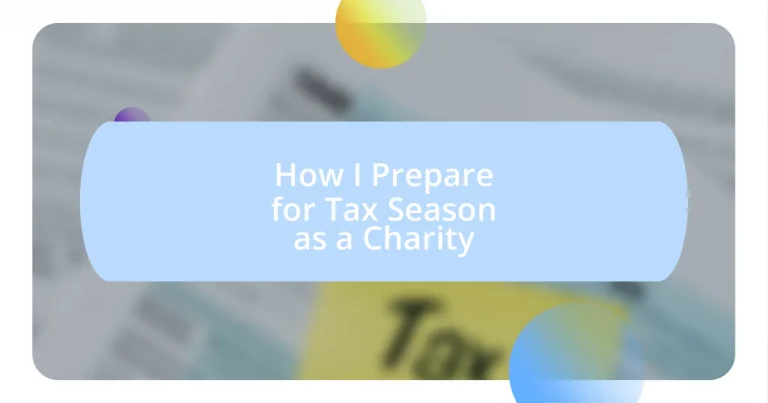Key takeaways:
- Charities have specific tax responsibilities, including understanding tax-exempt income and unrelated business income.
- Organizing financial documents and donation records efficiently helps streamline tax preparation and enhances accountability.
- Engaging a professional tax advisor provides invaluable guidance on navigating tax laws and maximizing potential deductions for charities.
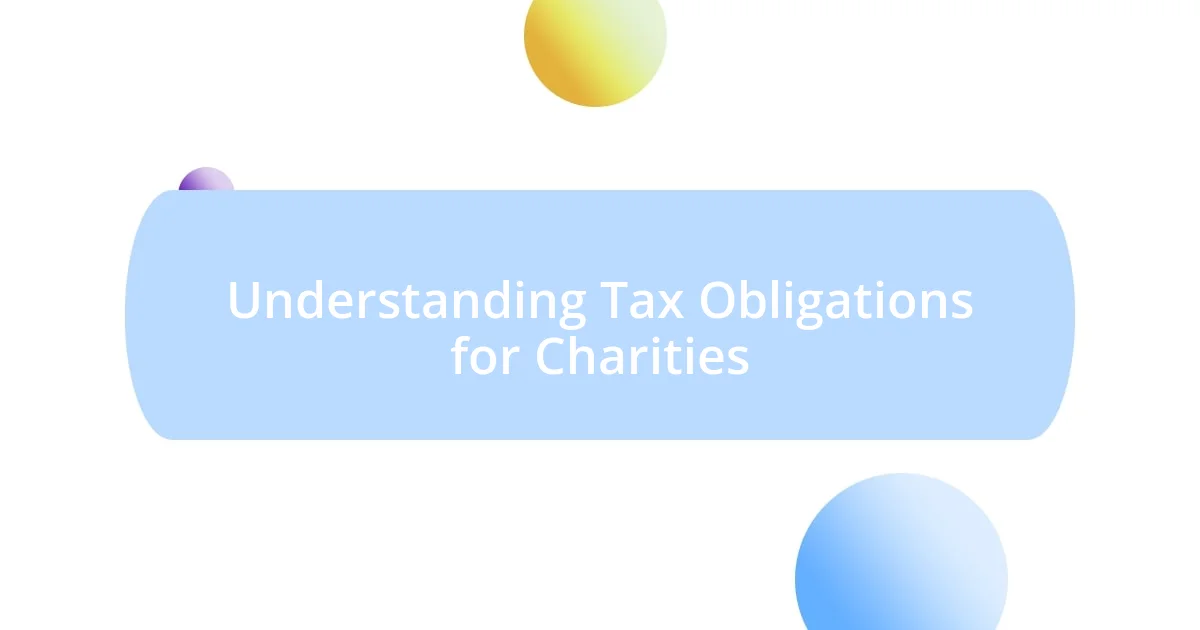
Understanding Tax Obligations for Charities
Understanding tax obligations for charities can feel overwhelming, but it’s crucial to stay informed. I remember when I first discovered that even though we’re a nonprofit, we still have specific tax responsibilities. It was a lightbulb moment – the idea that adhering to these obligations not only helps us stay compliant but also builds trust within the community we serve.
Many people assume that charities don’t pay taxes, but that’s only partially true. For instance, while most income generated from charitable activities is tax-exempt, unrelated business income can be taxed. Have you ever thought about how your organization earns its revenue? This awareness can save you from unexpected liabilities and guide you toward making smarter financial decisions.
It’s not just about filing the right paperwork, but understanding how our operations fit into the tax landscape. I often ponder how some small changes in our processes could optimize our tax situation. Taking time to learn about exemptions, deductions, and overall compliance can make a significant difference in how we allocate our resources for the mission at hand.
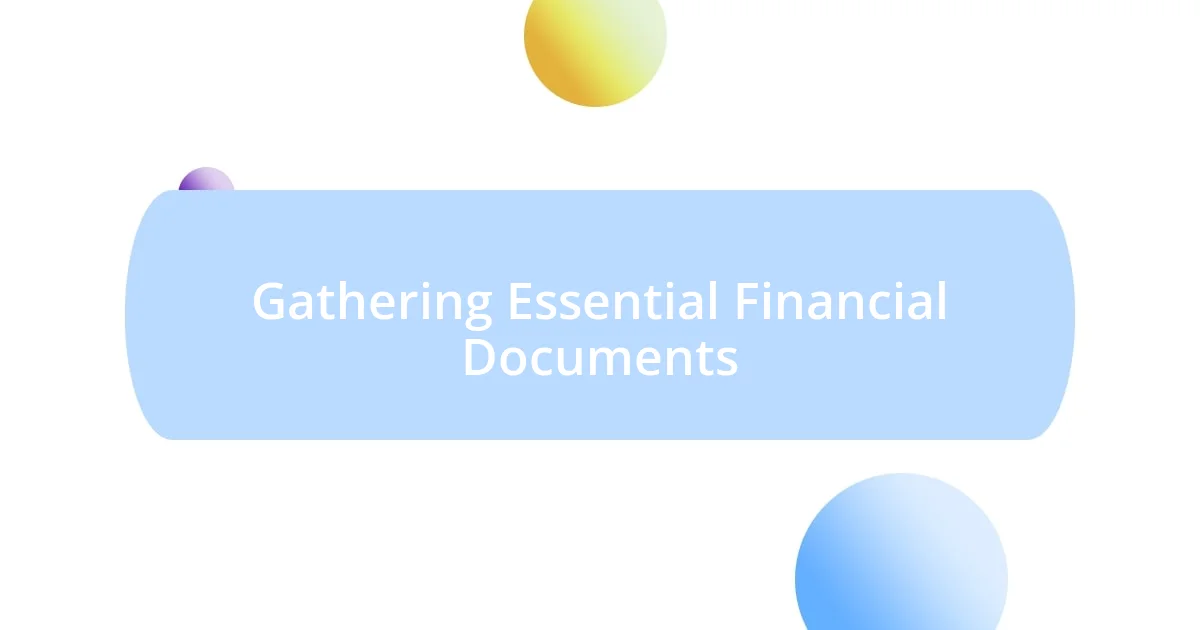
Gathering Essential Financial Documents
When it comes to gathering essential financial documents, I always start by compiling all relevant income statements and expense reports. The process is more than just organizing papers; it’s about revisiting the impact we’ve made throughout the year. I remember the first time I went through our financials, feeling a mix of anxiety and pride as I realized how much we had achieved with limited resources.
Here’s what I typically focus on when collecting essential documents:
- Annual financial statements
- Bank statements
- Receipts for major expenses
- Donation records
- Fundraising event records
- IRS Form 990, if applicable
I find that having this information at my fingertips not only eases the tax preparation process but also provides a clearer picture of our financial health. Each document tells a story that we need to reflect on and understand as we prepare for the tax season ahead.
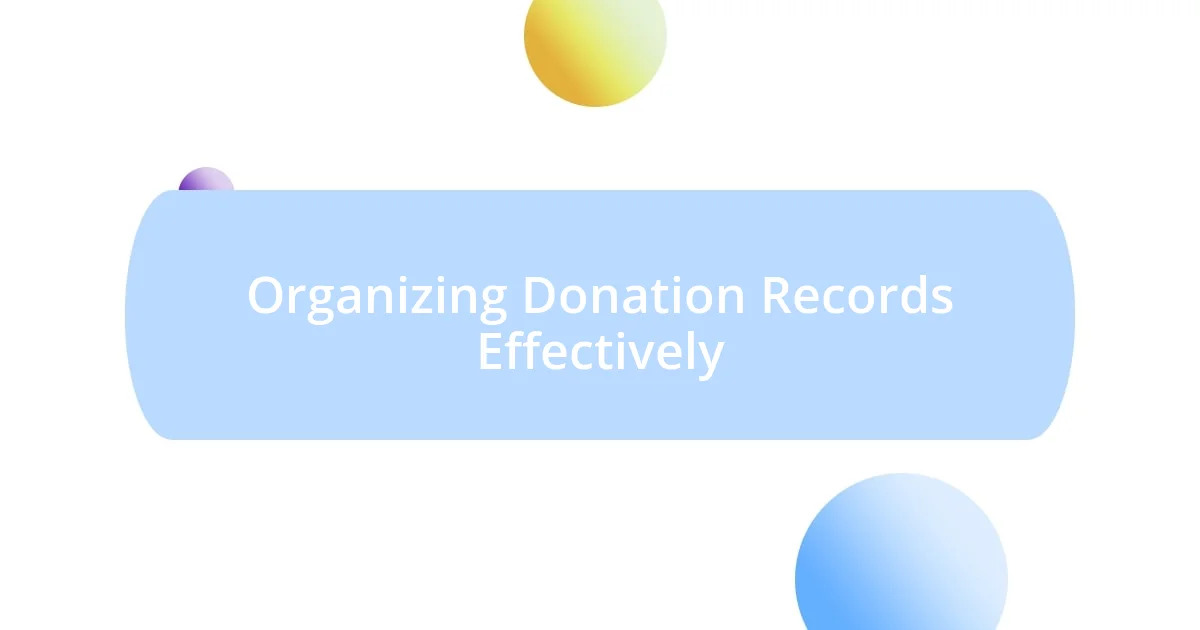
Organizing Donation Records Effectively
When it comes to organizing donation records, I’ve learned that digital solutions can save your sanity. Early on, I relied heavily on spreadsheets, but it quickly became overwhelming as the volume of donations grew. Now, I use specific software tailored for charities to manage these records. This transition not only simplified tracking donations but also fostered a deeper connection with our supporters. Seeing how each contribution plays a pivotal role in our mission has been incredibly rewarding.
Another key element is categorizing donations. I organize records by donor type and donation method, which makes retrieval easy during tax season. I once lost an entire spreadsheet file due to a glitch – it was a nightmare! Since then, I’ve established a robust naming convention and backup system that allows me to access any record quickly. I always add comments regarding the source of the donations, which aids in better donor relationship management and ensures transparency.
Lastly, regular updates to donation records are essential. I make it a habit to input data weekly rather than cramming everything during tax season. This practice not only alleviates stress but also creates a routine that’s easier to maintain. I encourage my team to participate in this process, promoting a collective ownership that deepens our commitment to our mission. Keeping this information organized benefits not just tax preparation but our overall accountability to the community we serve.
| Method | Benefits |
|---|---|
| Digital Software | Simplifies management and provides clear insights. |
| Organizing by Category | Facilitates easy access and improves donor relations. |
| Regular Updates | Reduces stress and enhances accountability. |
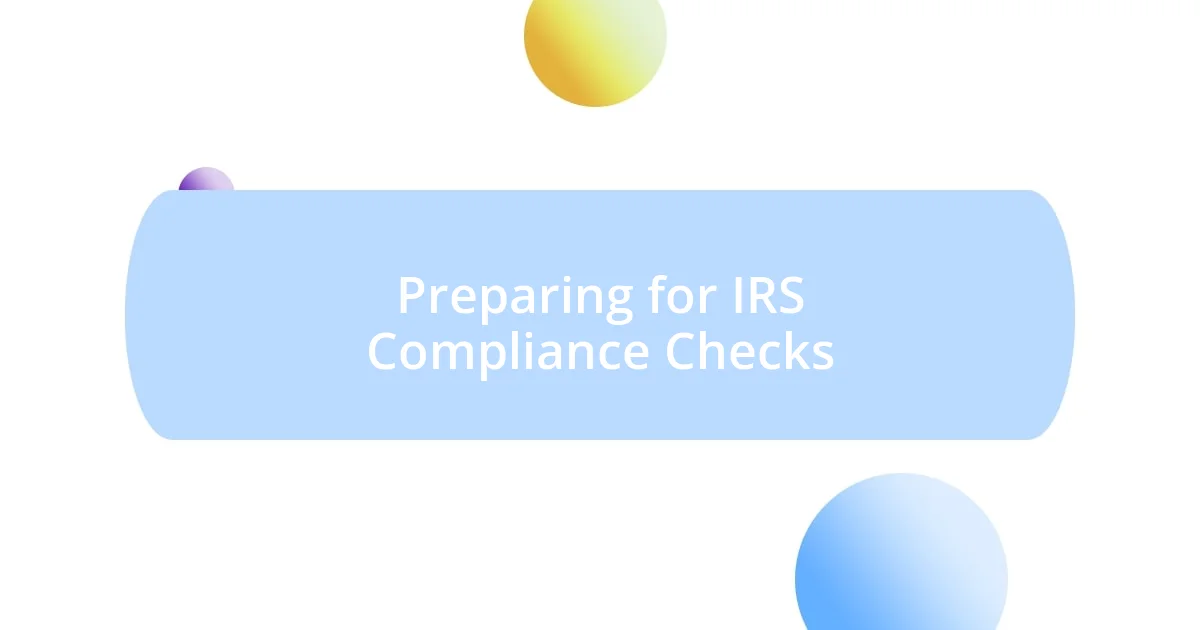
Preparing for IRS Compliance Checks
Preparing for IRS compliance checks is something I take seriously. The stakes are high; a simple mistake can lead to audits or penalties. I recall the time I missed a deadline for filing our Form 990. The stress that ensued taught me the importance of maintaining a calendar with key tax deadlines. Now, I make it a priority to set multiple reminders. Having a clear timeline is not just a safety net; it’s peace of mind during an often hectic season.
I always conduct a thorough review of our practices related to donor reporting and the acceptance of charitable contributions. During one of my compliance checks, I was surprised by how many inconsistencies I had overlooked in our records. This prompted me to create a checklist that I use to validate donor information and ensure we’re following any IRS guidelines. This proactive approach mitigates risks and reinforces our integrity as a charity.
Another essential step involves gathering and maintaining proper documentation to substantiate our claims. Let me tell you, I’ve had my fair share of headaches with missing receipts! Now, I make it a habit to scan all important documents immediately and store them in cloud-based services. This practice not only simplifies audits but also allows me to breathe easier, knowing I can swiftly provide the necessary information if questioned. It’s not just about compliance; it’s about fostering trust with our supporters and the IRS. Who can argue with having that kind of assurance?
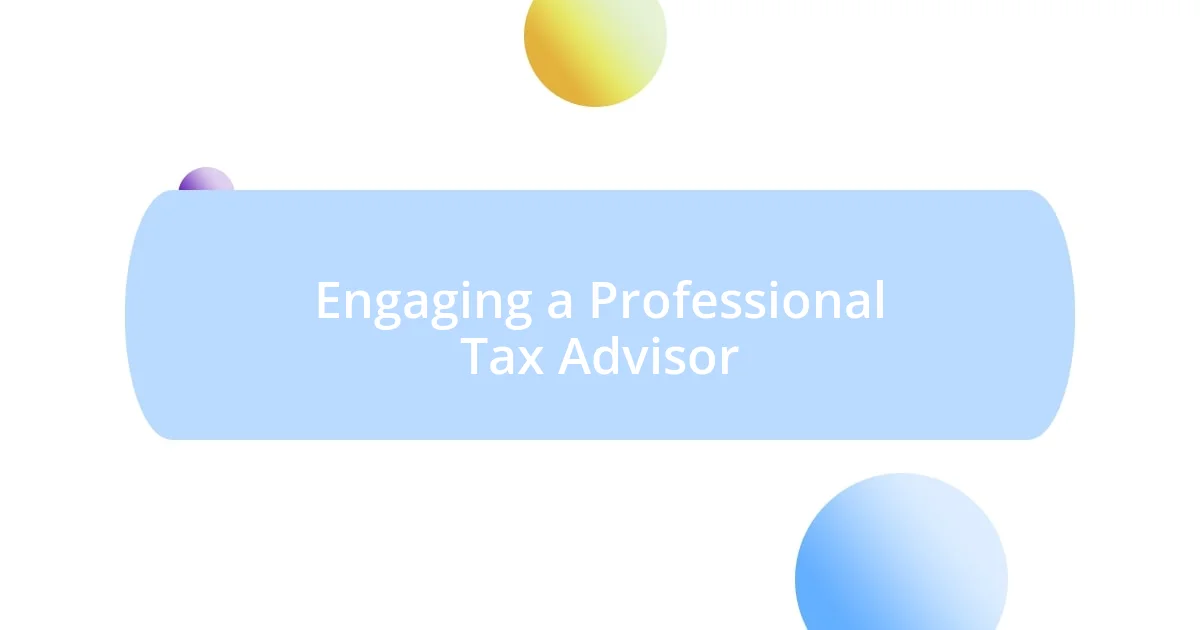
Engaging a Professional Tax Advisor
Connecting with a professional tax advisor is one of the most beneficial decisions I’ve made for our charity. I remember the first time I hired an advisor; it was like lifting a heavy weight off my shoulders. They brought a wealth of knowledge about tax laws that I had only scratched the surface of. I often found myself asking, “Am I even doing this right?” Having an expert who can answer those questions and clarify complexities is invaluable.
Navigating the intricacies of nonprofit tax regulations can be daunting. During one tax season, I relied solely on online resources, thinking I could DIY everything. Let me tell you, it backfired! I missed several critical deductions that could have significantly boosted our budget. Since then, I’ve partnered with a trusted tax advisor who not only helps with preparation but also advises on financial strategies throughout the year. The peace of mind that comes from knowing someone knowledgeable is overseeing this process is something I can’t emphasize enough.
When engaging a tax advisor, I believe it’s essential to find someone who understands our charity’s mission. I’ve had advisors in the past who viewed us strictly as another client. But now, I work with someone who gets our vision. They not only support us through tax season but also offer advice tailored to our goals. It’s like having a partner who genuinely cares about our success. Doesn’t that sound ideal? Investing in someone who shares your passion can make a world of difference, don’t you think?
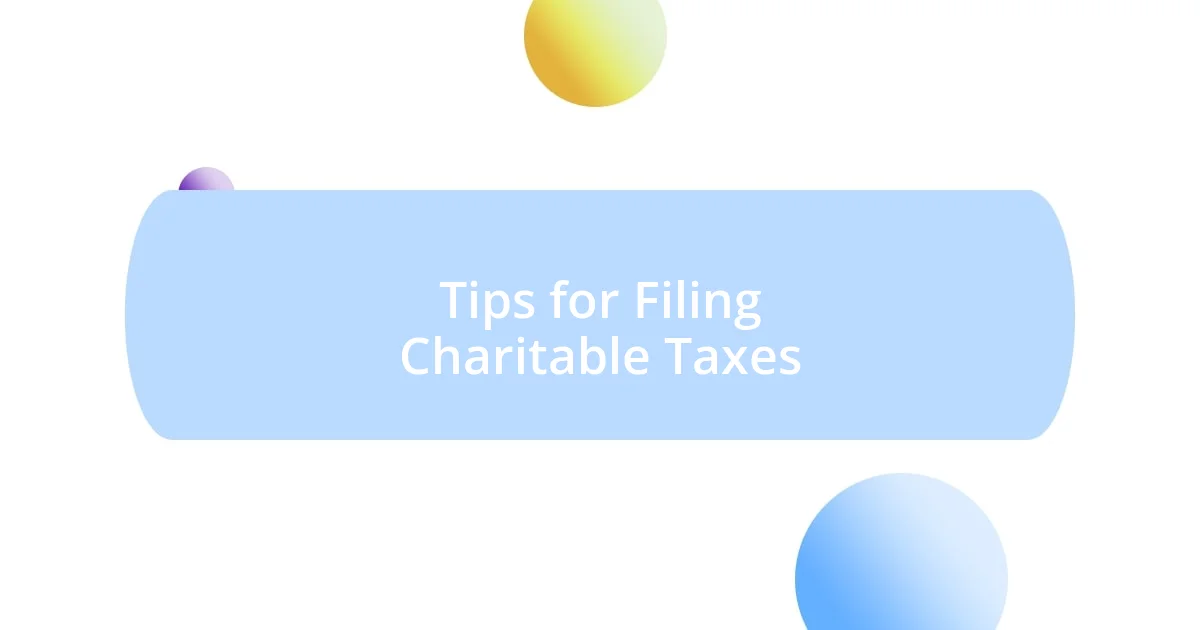
Tips for Filing Charitable Taxes
Filing our charitable taxes effectively requires careful attention to detail, and one tip I swear by is keeping a dedicated folder for receipts and documents related to contributions and expenses. I once found myself scrambling at the last minute to find a crucial donation receipt, which added unnecessary stress to an already hectic time. Since then, I’ve adopted a simple system: each month, I sort through our financials, file away documents, and ensure everything is in one organized place. Trust me, this routine has saved me countless hours and headaches.
I also recommend staying updated on any recent changes in tax laws that might affect our nonprofit status. Just last year, I discovered a new IRS initiative that allowed us to claim additional deductions, transforming what I thought would be a regular filing season into one of unexpected financial benefits. I can’t stress enough how important it is to subscribe to newsletters from reputable tax organizations or even follow key figures and advocacy groups on social media. A little proactive research can pave the way for significant gains.
Lastly, one of my best practices is to do a trial run before the actual filing deadline. Last year, I simulated our tax filing process by gathering all the necessary documents and inputting our information into the tax software. It took some extra time, but the effort revealed a few inconsistencies in our data that would have caused issues later. I think it’s crucial to ask ourselves, “What if there’s something I haven’t considered?” Taking the time to cross-check everything beforehand not only boosts our confidence but also ensures we submit an accurate and complete return, ultimately making the entire process smoother.












